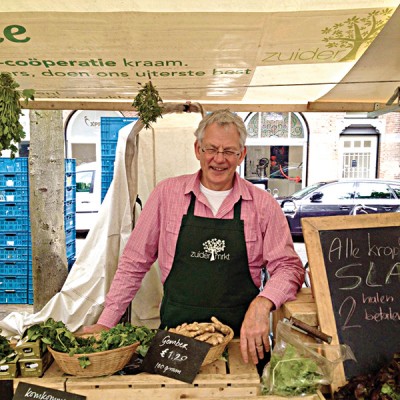People, planet, prosperity
David Korslund ’76 began his career at Shore Bank in Chicago while completing his MBA at the University of Chicago. From 1983-2009 he worked with ABN AMRO Bank in the United States and the Netherlands, holding a variety of senior positions. He is senior advisor to the Global Alliance for Banking on Values (GABV), a consortium of socially progressive and innovative banks focused on delivering sustainable economic development and environmental improvement. He led a project for the GABV initiating Sustainability | Finance | Real Economies, which he continues to advise. He also works with Enclude on providing strategic advice to banks seeking to deliver a triple-bottom line of people, planet, and prosperity. He resides in Amsterdam, the Netherlands, with his Dutch husband.
 Q: What inspires you to work toward “people, planet, prosperity”?
Q: What inspires you to work toward “people, planet, prosperity”?
A: Seeing the work of the Bangladesh Rural Advancement Committee (BRAC), an international development organization in Bangladesh, in 2010 was a real source of inspiration. BRAC was founded by Sir Fazle Abed after a horrific civil war and natural disaster. It has grown to be the world’s largest non-governmental organization with more than 100,000 co-workers focused on meeting the needs of all Bangladeshis. BRAC understands that human challenges can only be addressed on a holistic basis. Providing social empowerment, environmental regeneration, and economic resiliency are not competing goals but must be delivered together. When you see the results of their work and the wisdom of Sir Abed, there is real inspiration for trying in some small way to further that message and development.
Q: What do you find appealing about being an ex-pat?
A: I rarely think of myself as an ex-pat, but more as someone hovering over the Atlantic Ocean. When you live overseas for as long as I have (nearly 20 years), you realize that you are not “ex” anything but more “plus” with multiple countries and cultures to call home. That leads to openness to consider many views when looking at issues rather than jumping to easy conclusions. It also means I am open to the values of diversity and multiculturalism, while feeling myself grounded in the values of the Enlightenment—a movement in which Amsterdam played an important role.
Q: What’s the most important thing you learned at Cornell?
A: How to continuously learn and develop—two key components for a modern life when faced with constant change.
Q: What person on campus had the biggest impact on you?
A: Probably the two most influential were Craig Allin and Bob Dana. Both challenged me to think and write in a clear and thoughtful way. They, along with so many other great people at Cornell, created the conditions for me to be on a path of growth and development—a path continuing today.
Q: What qualities do you most admire in others?
A: Passion for life, directness with good manners, and focus on facts not beliefs.
Q: What makes you happiest?
A: Successfully working with others to solve a complex problem—preferably when innovation is needed. But also quiet times with family and friends, especially walks through nature or a dinner at home.
Q: Does Amsterdam have any similarities to Iowa?
A: Surprisingly, there are many, including a very small-town feel. Amsterdam is part of a large metropolitan area, but Amsterdam is often referred to as a village by those who know it. I shop with local merchants who recognize me when I come in the door. I volunteer at a locally organized cooperative farmers market, a real Iowa experience. I continually run into friends and acquaintances, so the small town feel is very real.
